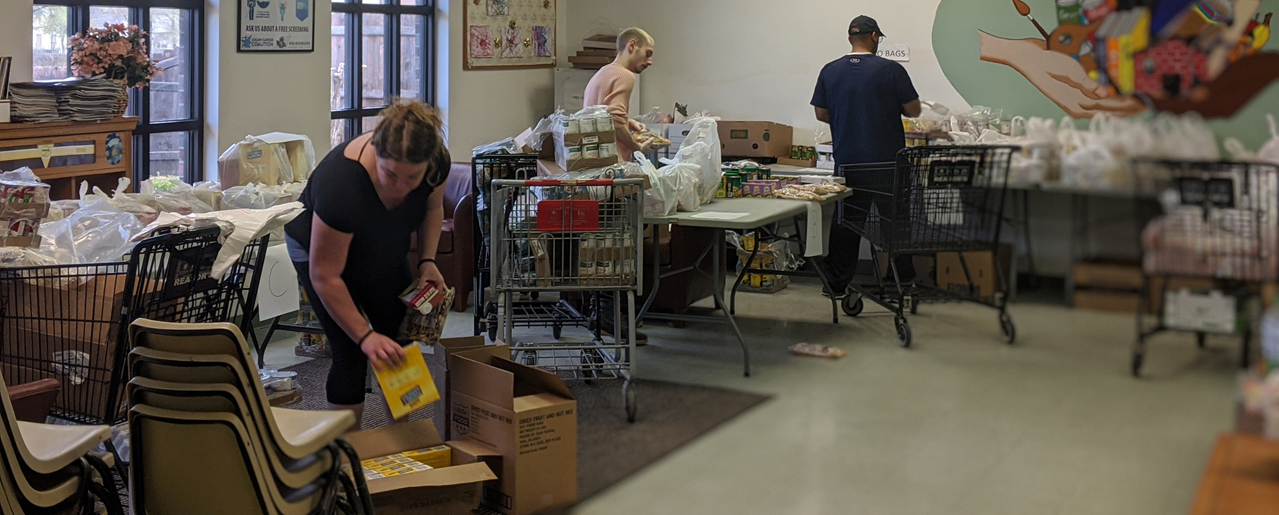Our Beginnings
Neighbors Along the Line (NATL) was established in 1976, after the minister of John Knox Presbyterian Church, Dr. Richard Evans, received a phone call from a social worker at the Tulsa Housing Authority. An abused wife and mother had arrived in Tulsa with her children, owning nothing but the clothes on their backs. The Housing Authority gave them shelter, and the John Knox congregation provided food, furnishings, and other necessities.
From this beginning came NATL. The non-profit organization was to help residents of Northwest Tulsa meet basic needs. The Sandy Park area was the focus of assistance from 1976 to 1981. When the need for a medical clinic was brought to the attention of Dr. Ledbetter, a member of John Knox Presbyterian Church, he founded the Monday night free clinic, which continues to this day.
Over the years, NATL served residents in the Charles Page area of Tulsa from a number of different locations. Some of our many locations have included Sandy Park Apartments, Riley School, and Harrison Memorial Methodist Church. Our current location, a 5,600 square foot community center, was completed in 1997.
__________
NATL’s Primary Service Area
NATL expanded its reach as it became apparent that more residents in surrounding areas were in need of assistance as well. NATL’s primary service area eventually grew to include the neighborhoods within the following boundaries:
- Highway 244 to the East
- 81st Avenue to the West
- The Arkansas River to the South
- Edison Street (the Osage County Line) to the North
In 2008, we began offering our full range of services to residents of Sand Springs as well. While a certain few of our services are only available to those living in our primary service area or Sand Springs (Food Pantry, Utilities Assistance, and Holiday Assistance), the majority of our programs serve anyone in need, regardless of where they reside.
__________
The Forgotten Part of Tulsa
While the area served by NATL was once thrived with industry and oil, loss of major employers, expressway construction, and other factors combined to cause tremendous losses in population and income to area residents. Many residents refer to this area as “the forgotten part of Tulsa,” as it is often the first area to lose service when social programs are cut.
According to the most recent data from the Census Bureau and the USDA, NATL’s primary service area faces severe levels of poverty, food insecurity, unemployment, low educational attainment, and uninsurance relative to Tulsa County averages. The coronavirus pandemic is exacerbating the challenges facing those living in poverty, making the need for more social services increasingly vital.
__________
Comprehensive Services in One Location
Many area residents do not have transportation, so NATL strives to provide as many essential services in one location as possible. Residents can receive help with food, medical needs, and literacy issues, as well as career services, utility assistance, answers to legal questions, WIC referrals, and substance abuse resources. We also offer various seasonal programs, such as immunizations and assistance with Thanksgiving, Christmas, and school supplies.
As part of our comprehensive services, we provide clients with information on how to take an active role in improving their living situations. For instance, we frequently refer Food Pantry clients to our Literacy and Development program for help getting their diploma or searching for jobs and to the Department of Human Services for SNAP program enrollment.
__________
A Community Effort
NATL is run by a core group of three full-time and two part-time staff members, an active Board of Directors, and over fifty regular volunteers. All of our services are provided free of charge through the generosity of foundations, individuals, churches, and corporations.


